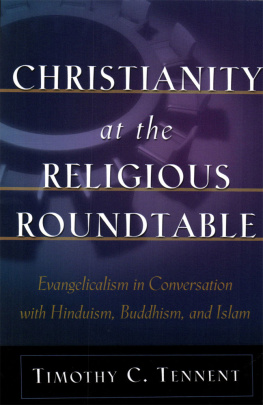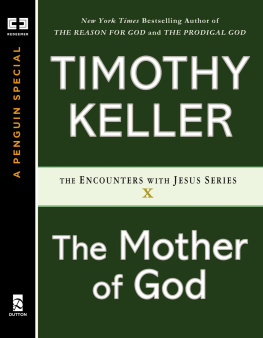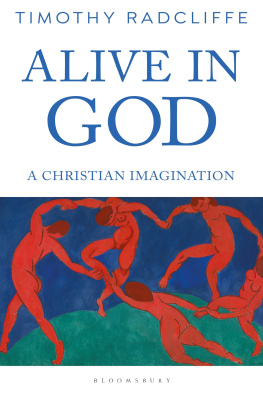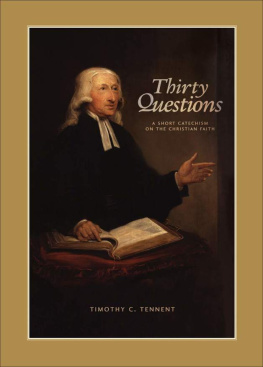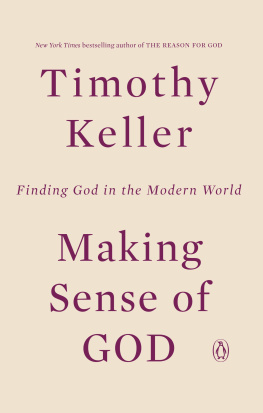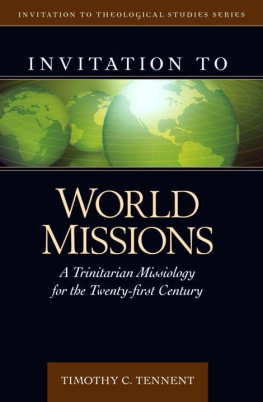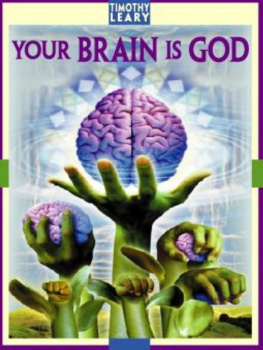Timothy C Tennent - Christianity at the Religious Roundtable
Here you can read online Timothy C Tennent - Christianity at the Religious Roundtable full text of the book (entire story) in english for free. Download pdf and epub, get meaning, cover and reviews about this ebook. year: 2002, publisher: Baker Publishing Group, genre: Religion. Description of the work, (preface) as well as reviews are available. Best literature library LitArk.com created for fans of good reading and offers a wide selection of genres:
Romance novel
Science fiction
Adventure
Detective
Science
History
Home and family
Prose
Art
Politics
Computer
Non-fiction
Religion
Business
Children
Humor
Choose a favorite category and find really read worthwhile books. Enjoy immersion in the world of imagination, feel the emotions of the characters or learn something new for yourself, make an fascinating discovery.
- Book:Christianity at the Religious Roundtable
- Author:
- Publisher:Baker Publishing Group
- Genre:
- Year:2002
- Rating:3 / 5
- Favourites:Add to favourites
- Your mark:
- 60
- 1
- 2
- 3
- 4
- 5
Christianity at the Religious Roundtable: summary, description and annotation
We offer to read an annotation, description, summary or preface (depends on what the author of the book "Christianity at the Religious Roundtable" wrote himself). If you haven't found the necessary information about the book — write in the comments, we will try to find it.
Christianity at the Religious Roundtable — read online for free the complete book (whole text) full work
Below is the text of the book, divided by pages. System saving the place of the last page read, allows you to conveniently read the book "Christianity at the Religious Roundtable" online for free, without having to search again every time where you left off. Put a bookmark, and you can go to the page where you finished reading at any time.
Font size:
Interval:
Bookmark:
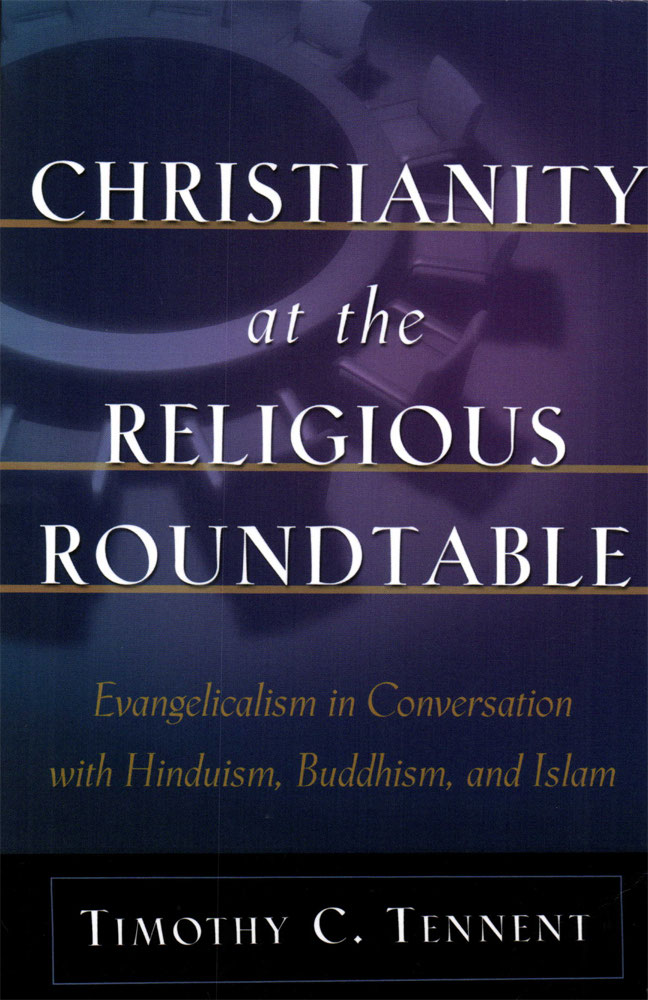

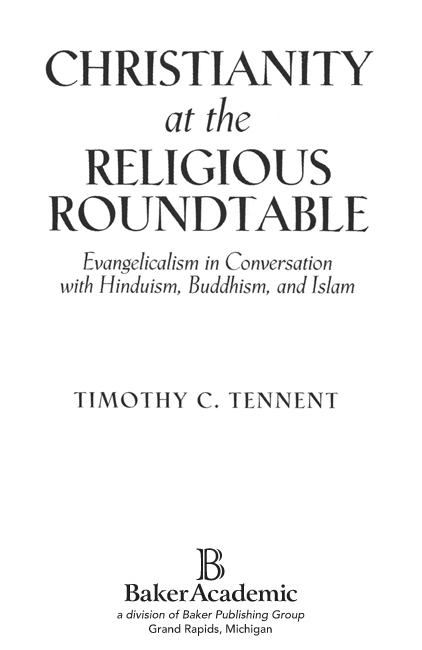
2002 by Timothy C. Tennent
Published by Baker Academic
a division of Baker Publishing Group
P.O. Box 6287, Grand Rapids, MI 49516-6287
www.bakeracademic.com
Ebook edition created 2013
All rights reserved. No part of this publication may be reproduced, stored in a retrieval system, or transmitted in any form or by any meansfor example, electronic, photocopy, recordingwithout the prior written permission of the publisher. The only exception is brief quotations in printed reviews.
Scripture quotations are from the Holy Bible, New International Version. NIV. Copyright 1973, 1978, 1984 by Biblica, Inc. Used by permission of Zondervan. All rights reserved worldwide. www.zondervan.com
ISBN 978-0-8010-2602-7
Library of Congress Cataloging-in-Publication Data is on file at the Library of Congress, Washington, DC.
I am indebted to the trustees and faculty of Gordon-Conwell Theological Seminary for granting me a sabbatical to write this book. The particular encouragement I received from Haddon and Bonnie Robinson during my months away from the seminary will long be remembered. I would also like to express my gratitude for two of my former professors and now colleagues, David Wells and Garth Rosell. David Wells first taught me the importance of theology in understanding, interpreting, and responding to the ongoing challenges that the church faces. Garth Rosells ability to ignite ones passion for church history is well known. I am particularly indebted to him for the broad, global view of the churchs life that he so ably gives to his students. As a missiologist at Gordon-Conwell, I now find myself striding the two wonderful worlds of theology and church history. Under the able leadership of Garth Rosell, the Division of Christian Thought at Gordon-Conwell nurtures a wonderfuland neededrelationship between missions, theology, and church history. As my dear colleague Peter Kuzmi is fond of declaring at our divisional meetings, Good missions must be theologically grounded, and good theology must be missiologically focused! To work alongside Christian leaders like David Wells, Garth Rosell, and Peter Kuzmi in this kind of cooperative environment is truly one of the greatest joys of my professional life.
I also appreciate my students at Gordon-Conwell. Without the interaction with students in my classes over the years, many of the ideas in this book would not have been realized. I am particularly indebted to Sean Doyle, Allen Yeh, and Jeremy John who have served as my Byington research assistants over the last three years. They have each spent many hours in the library on my behalf, and, undoubtedly, this book reflects their hard work.
I divided my sabbatical between the Overseas Ministries Study Center in New Haven, Connecticut, and the New Theological College in Dehra Dun in Uttaranchal, India. I am indebted to Jonathan Bonk, the director of OMSC, and his staff for their encouragement and support during my studies at Yale. Likewise, the time spent each year in Dehra Dun is always a time of intellectual and spiritual refreshment. I am deeply grateful to the founder of NTC, George Chavanikamannil, whose missionary vision and heart for church planting in India is, in my mind, without parallel.
I am dedicating this book to my wife Julie, whose steadfast commitment to Jesus Christ and joyful spirit remain a constant source of inspiration and encouragement. Besides being a gifted musician, she has brought music and joy into my life and the lives of our two children, Jonathan and Bethany, in more ways than can be recounted here.
Timothy C. Tennent
I confess that although I have read dozens of books on interreligious dialogue, I have enjoyed precious few of them. Yet I am now in the curious position of writing such a book. Upon reflection, the basic reason for my dissatisfaction is that the average Christian would hardly recognize the Christianity that is often presented in such works. Certainly, the apostlesthe eye- and ear-witnesses of Christs life and the first to testify about himwould go away scratching their heads in bewilderment. The Christian gospel is often presented as one among many different paths to God. Christianity is ranked side by side with religions such as Islam, Hinduism, and Buddhism in much the same way as films are displayed at a multiplex cinema. The Islamic Qurn or the Hindu Upanishads are as likely to yield spiritual light as the Sermon on the Mount.
I do not believe that the authors of such books distort the gospel message intentionally or maliciously. Rather, most of them simply do not affirm the historic Christian confessions; yet curiously they continue to identify themselves as Christians. Even scholars among the non-Christian religions have begun to recognize this phenomenon. For example, Grace Burford, a practicing Buddhist scholar, comments on this in a recent Buddhist-Christian dialogue titled Buddhists Talk about JesusChristians Talk about the Buddha.[1] Her chapter is insightfully titled If the Buddha Is So Great, Why Are These People Christians? She bluntly asks about these scholars, If they were so taken by Buddhism, why did they hang on to Christianity?[2] Her remarks are limited to the Buddhist-Christian dialogue but could easily be observed throughout the whole field of interreligious studies. Why would people be prepared to surrender every central claim of historic Christianity and yet be so doggedly determined to remain spokespersons for Christianity? The same point is made by evangelical scholar Ron Nash in his excellent book Is Jesus the Only Savior?[3] He points out how John Hick, who is widely regarded as one of the leading voices in the Christian dialogue with other religions, continues to call himself a Christian despite having abandoned the historic faith. Nash goes on to say, I mean no ill-will when I say that Hick is not a Christian in any historical, traditional, or biblical sense of the word. This is not being unkind; it is only being accurate.[4] These observations from a Buddhist scholar and a leading evangelical scholar testify to the current state of interreligious dialogue. People who stand outside the boundaries of historic Christianity are representing Christianity. The tragic result is that many readers assume that the positions taken by these scholars reflect a broad consensus among Christians around the world.
This is not to say that there have not been several excellent books written to defend historic Christianity in light of the particular challenges of world religions. Lesslie Newbigins The Gospel in a Pluralist Society, J. N. D. Andersons Christianity and Comparative Religion, and Ravi Zachariass Jesus Among Other Gods, are a few examples of excellent contributions to this field.[5] However, these books are not examples of interreligious dialogue per se. They are defenses of historic Christianity in light of growing religious pluralism. These books are extremely important and we need more like them, but we also need more evangelical Christians involved in genuine dialogue with members of other religions. This book seeks to meet that need and to prepare Christians as they begin to take more seriously our obligation to listen and respond to the objections of non-Christian religions.
Font size:
Interval:
Bookmark:
Similar books «Christianity at the Religious Roundtable»
Look at similar books to Christianity at the Religious Roundtable. We have selected literature similar in name and meaning in the hope of providing readers with more options to find new, interesting, not yet read works.
Discussion, reviews of the book Christianity at the Religious Roundtable and just readers' own opinions. Leave your comments, write what you think about the work, its meaning or the main characters. Specify what exactly you liked and what you didn't like, and why you think so.

